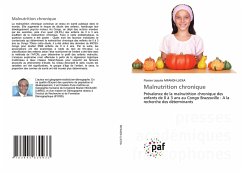
Chronic Malnutrition
Prevalence of chronic malnutrition in children aged 0-3 years in Congo Brazzaville: In search of the determinants
Versandkostenfrei!
Versandfertig in 6-10 Tagen
28,99 €
inkl. MwSt.

PAYBACK Punkte
14 °P sammeln!
Chronic malnutrition is a global public health issue. It increases children's risk of death and impairs their psychomotor development. In Congo, despite the actions taken by the authorities, nearly a quarter (22.8%) of children aged 0 to 3 years suffer from chronic malnutrition. In response to this problem, the following question was asked: What are the individual and contextual factors that determine chronic malnutrition in children aged 0 to 3 years in Congo? In this study, data from MICS5-Congo were used to study 5,599 children aged 0 to 3 years. Subsequently, associations were examined usi...
Chronic malnutrition is a global public health issue. It increases children's risk of death and impairs their psychomotor development. In Congo, despite the actions taken by the authorities, nearly a quarter (22.8%) of children aged 0 to 3 years suffer from chronic malnutrition. In response to this problem, the following question was asked: What are the individual and contextual factors that determine chronic malnutrition in children aged 0 to 3 years in Congo? In this study, data from MICS5-Congo were used to study 5,599 children aged 0 to 3 years. Subsequently, associations were examined using the Chi-square test. The classification of children according to their nutritional status was done using the AFCM method to determine the profile of malnourished children. Explanatory analysis was performed using two-level multivariate logistic regression to identify factors associated with the study phenomenon. At the bi-level descriptive level, all variables were significant. The child's age group, gender, and the proportion of health centres were found to be more determinant.












